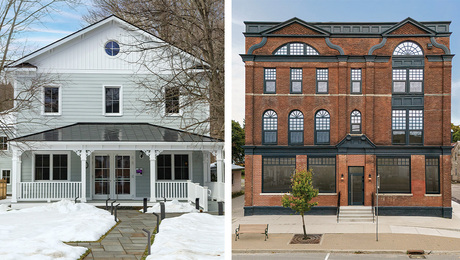In a do it yourself remodeled basement can the electric panel be in the bathroom/laundry room? I wouldn’t be putting the panel in the bathroom but I would be adding a bathroom/laundry room in the same room that the panel is in now. It is in minnesota if the state makes a difference. Is it requried to have any electical work that you do yourself be inspected?
Discussion Forum
Discussion Forum
Up Next
Video Shorts
Featured Story

A high-performance single-family home builder shares tips from his early experience with two apartment buildings.
Featured Video
SawStop's Portable Tablesaw is Bigger and Better Than BeforeHighlights
"I have learned so much thanks to the searchable articles on the FHB website. I can confidently say that I expect to be a life-long subscriber." - M.K.
Fine Homebuilding Magazine
- Home Group
- Antique Trader
- Arts & Crafts Homes
- Bank Note Reporter
- Cabin Life
- Cuisine at Home
- Fine Gardening
- Fine Woodworking
- Green Building Advisor
- Garden Gate
- Horticulture
- Keep Craft Alive
- Log Home Living
- Military Trader/Vehicles
- Numismatic News
- Numismaster
- Old Cars Weekly
- Old House Journal
- Period Homes
- Popular Woodworking
- Script
- ShopNotes
- Sports Collectors Digest
- Threads
- Timber Home Living
- Traditional Building
- Woodsmith
- World Coin News
- Writer's Digest


















Replies
Our panel (MN, 1976 construction) is in the laundry room (which is also the utility room). I know I've seen them in the bathroom in older apartments.
I wouldn't regard the bathroom as a good idea, though, due to shower humidity. But otherwise I think it's just a matter of keeping it N feet away from any sinks, etc.
(Installed one over the stove in Puerto Rico, but we don't want to go there.)
Code, IIRC, is laundry room yes, bathroom no. I doubt there's an exception for "the panel was there first".
-- J.S.
Dare I say this? but our panel is right under a hose bib! The bib leaked once and the panel was soaking wet, but nothing bad happened. I asked the plumber to move it over when he replaced the bib, but he didn't because he would have had to drill a new hole in the side of the house, etc..
I assume you mean the panel is on the inside and the bib is on the outside, but it froze and leaked inside? Don't think there's any rule against having pipes close to the panel, it's just faucets, etc, that are the problem, and the code would regard a faucet on the other side of the wall as not being there.
>>Don't think there's any rule against having pipes close to the panel, it's just faucets, etc, that are the problem, and the code would regard a faucet on the other side of the wall as not being there.
Technically, there shouldn't be any water piping over the panel.
Rarely followed in my area.
"It is as hard for the good to suspect evil, as it is for the bad to suspect good."
-- Marcus Tullius Cicero, statesman, orator, writer (106-43 BCE)
Yeah, you read me correctly, faucet outside, panel inside and the pipe to the faucet leaked. Good to know that it's okay by code. Just seemed not the best way to do it, seeing as a leak could (and did) happen. But no harm, no foul. Thanks for the info.
There is a dedicated electrical space that is as wide and deep as the panel and extends 6' above it or to the structural ceiling."No piping,ducts,...or other equipment foreign to the electrical installation shall be located in this zone".The only exception is for suspended ceilings with removable panels.
Barry, in residential, do you feel that would include the gridwork for a drop ceiling? The drop tiles themselves?
"It is as hard for the good to suspect evil, as it is for the bad to suspect good."
-- Marcus Tullius Cicero, statesman, orator, writer (106-43 BCE)
I would think either the T's or tiles would be allowed in the dedicated space above the panel.
Well, that makes sense. I guess what's done is done and I'll just have to keep an eye on it. Thanks.
To answer the other part of your Q. Yes, you should have electrical work done on your own inspected. Although, not knowing your local codes, they may not want to. I did a job in Wyoming, and the town official came up for my rough and I swear didn't look at one thing, framing, electrical, nothing. Complimented me on my work, wished the local guys were that picky, but never looked at one box, switch or anything. Best bet is to call you town hall and see what there SOP is. Even then with Elec. work, not a bad idea to have it looked at if they will.
Cole
Cole Dean
Dean Contracting